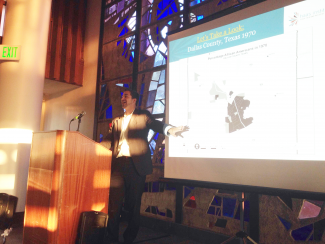Photo Credit: Rasheed Shabazz of Shabazz Images
On April 4, 2016, the Haas Institute for a Fair and Inclusive Society kicked-off Fair Housing Month by co-sponsoring Fighting Exclusion: Innovative Approaches to Fair Housing Law. The California Renters Legal Advocacy and Education Fund (CaRLA) and the American Constitution Society at Boalt Hall also co-sponsored the panel discussion, which addressed possible court remedies to land use practices that exclude people based on race or income. CaRLA’s Brian Hanlon opened the discussion by placing zoning in its historical context as a means to segregate people. Citing precedent set by a recent Supreme Court decision that upheld a key interpretation of the Fair Housing Act, Hanlon called for an aggressive legal and political fight to overturn exclusionary land use practices.
Stephen Menendian, the Assistant Director of the Haas Institute, discussed the reality of racial segregation in the United States, noting that African American households remain as segregated from white households as they were in 1950. Menendian explained that a diverse set of actors worked to maintain racial segregation, including the federal government, private mortgage lenders, real estate lenders, and local governments. Land use policies implemented by cities and towns across the United States—such as housing density restrictions—raise the barrier to entry by inducing housing scarcity, which inflates housing prices and maintains racial segregation. Menendian stated that previous court challenges to exclusionary zoning in the 1970s failed, likely because the challenges relied on claims to Constitutional rights, not statutory rights. Given recent victories at the Supreme Court and in the 2nd and 9th federal appellate court circuits, advocates for inclusion might find further success appealing to the Fair Housing Act, rather than to the Constitution.
Paul E. Smith of the Department of Housing and Urban Development’s Office of Fair Housing and Equal Opportunity described HUD’s procedures for investigating and challenging claims of discrimination. He asserted that any effective movement to end segregation would need a political component—not solely a legal strategy. Mr. Smith requested that community groups assist HUD in cracking down on discriminatory practices by reporting such occurrences to HUD for fair housing law enforcement.
Audience members asked a diverse array of questions, including about vouchers for low-income renters, HUD enforcement, private legal efforts to overturn exclusionary zoning, and unintended consequences of some affordable housing policies. While not everyone agreed on the best method to combat residential exclusion, panelists and audience members alike left with a renewed dedication to fighting for inclusion.





